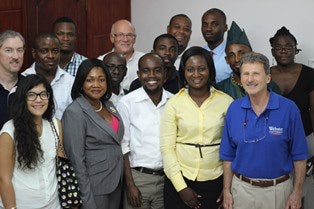 Webster University recently created an Accra, Ghana, campus offering bachelor’s and MBA degrees.
Webster University recently created an Accra, Ghana, campus offering bachelor’s and MBA degrees.
The university says on its website that its master’s degree in information technology will provide students with skills that focus on “practical applications in areas such as cyber security, mobile applications, wireless networking and strategic business planning.” It says students also will get the opportunity to do practicums and internships with multinational companies like IBM, Microsoft and Visa.
The master’s degree in electrical and computer engineering is focused on technology and teaches students skills in energy systems, mobile computing and telecommunications.
In recent years, St. Louis-based Webster University set up shop in Africa as well, establishing a campus in Ghana. The university now offers a bachelor’s degree in management as well as an MBA at its campus in Accra, the West African nation’s capital.
Bold new frontier
After conquering Europe and making significant headway in Asia and some parts of the Middle East like Dubai, many business schools from the United States and Europe are now exploring a bold new frontier: Africa.
While acknowledging the many challenges of setting up campuses on a continent that is largely undeveloped or underdeveloped, many business school administrators and university officials say they are attracted by the continent’s enormous growth potential.




















